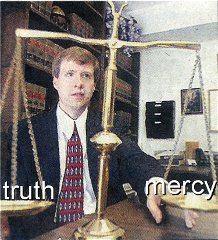New Bankruptcy Laws

Bankrupt - The dictionary still defines the word to mean "reduced to financial ruin; wholly lacking in or deprived of some essential." The word originated from Italy and literally means "broken bench". When a merchant was unable to pay his debts the bench from which he conducted business would be broken and he would be an outcast in the community. For centuries there has been this type of stigma associated with bankruptcy. Today that stigma no longer exist. To the average person the dictionary ought to more appropriately define the word as "financial setback; commendable entrepreneurial effort."
Recent economic headlines say it all: "Overdue credit card bills hit record" "U. S. Bankruptcy filings surge". Administer Justice has always taken the position that bankruptcy should be a matter of last resort and required individuals to go through credit counseling first. Over the years whenever an individual was told this they would usually get upset and find someone else to file the bankruptcy. Individuals with six digit incomes who could work their way out of debt were taking the quick and easy way out. Those purchases that had seemed so necessary for happiness were now a debt that was no longer worth paying. Like a no fault divorce, it was time to move on and rid oneself of the unhappy burden. Benjamin Franklin wisely said: ""Money never made a man happy yet, nor will it. There is nothing in its nature to produce happiness. The more a man has, the more he wants. Instead of its filling a vacuum, it makes one. If it satisfies one want, it doubles and triples that want another way."
Bankruptcy Abuse and Consumer Protection Act of 2005. Against this backdrop it is easy to understand why there has been such negative commentary on the new law that took effect in mid-October. The law does eliminate much of the ease and abuse that was taking place while at the same time it seeks to protect those most in need. For example under the former law a single mom receiving child support and/or maintenance may not have gotten her support if the father went bankrupt because while support was to be paid in the list of priority of payments it ranked seventh. Under the new law it receives the highest priority and is ranked first above taxes and all other payments.
How does the new law work? Instead of simply letting anyone eliminate all their debt, the new law uses a "means test" to identify debtors who could re-pay some money to their creditors. If the individual's income is above a set amount then they will have to file a 5-year Chapter 13 plan to pay creditors back instead of filing a Chapter 7 bankruptcy, which erases most debt. The means test looks at a family's monthly income. If the family income is lower than the median (a "median" is like an average) income in Illinois then the individual could file a Chapter 7 bankruptcy. The median monthly income for an Illinois family of 4 is about $5,750 which is significantly above the poverty line demonstrating the new law is targeting those families who should be able to make some payments but choose not to. If the family income is lower than the median amount then the means test won't affect them. But if the family income is over the median then the new law has a table of allowable expenses which is compared against income.
If a families income is above the median amount and after deducting allowable expenses - not those a person claims to be essential - the family has at least $166.67 in current monthly income the bankruptcy will be dismissed or converted to a chapter 13 to make payments over the next five years. If the family has at least $100 in current monthly income after the allowed deductions and the income is enough to pay at least 25% of the general unsecured debt over five years then the bankruptcy will also be dismissed or convered to a chapter 13.
Credit Counseling. The new law requires everyone to take an approved financial counseling course in the six months before filing bankruptcy or they will not be allowed to get a bankruptcy.
Other Changes. There are several other changes aimed at reducing common abuses. Prior to the change individuals would run up debt and take out cash advances just prior to filing for bankruptcy. Often these cash advances would be used for luxury items and to pay an attorney. Under the new law attorneys will be personally liable for helping their client avoid re-payments by understating income or not listing expenditures. The new law requires proof of income with a paystub and a tax return. Prior to this the individual did not need to offer any proof. In addition, debts for luxury goods of more than $500 that were purchased within 90 days before filing, and cash advances of $750 made within 70 days before filing will have to be repaid.
There are other provisions for valuing vehicles and to allow eviction proceedings to continue if the landlord can show "endangerment" of the property or "illegal use of controlled substances" on the property in the thirty days before the bankruptcy filing. Finally, the period of time between filing bankruptcies was lengthened from six years to eight years.
Ultimately an exterior set of rules cannot change the interior of a person so the ultimate effect of this new law may not be known. However, we applaud Congress and the President and hope that it may serve as a deterrent to debt. We stand ready to assist any individual in need. If you have more questions on the new law or want an appointment for financial counseling please call us at 847-844-1100 or e-mail us at help@administerjustice.org.
Posted by Bruce D. Strom, Executive Director.

